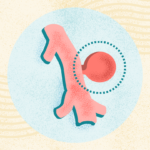Newer lung cancer treatments that exploit certain abnormalities in cancer cells are known as targeted therapies. These drugs are different from chemotherapy in the way they work. Unlike chemo, targeted therapy recognizes cancer cells based on mutations, or changes, in their DNA that are not seen elsewhere in the body. It specifically attacks the cancer cells, not healthy cells. Targeted therapy is used most often in people with advanced lung cancer. These medicines work for a period of time but then stop being effective.
Typically, targeted medicines don’t cause as many side effects as chemo, but you could experience a rash, diarrhea, fatigue, nausea, high blood pressure, liver function issues, and heart, vision, or lung problems.
Most targeted drugs work only if you have certain gene mutations, which your doctor can test you for. Here are ones that may be treated with targeted therapies for lung cancer.
EGFR Mutations
Epidermal growth factor receptor (EGFR) is a protein found on the surface of cells, and a mutation can affect how well it functions. Changes in the epidermal growth factor receptor (EGFR) gene can be treated with drugs, such as:
- afatinib (Gilotrif)
- dacomitinib (Vizimpro)
- erlotinib (Tarceva)
- gefitinib (Iressa)
- osimertinib (Tagrisso)
ALK Fusion
About 5 percent of NSCLCs have an alteration in the anaplastic lymphoma kinase (ALK) gene. When mutated, it can cause abnormal cell growth and spread. Drugs that target ALK changes include:
- alectinib (Alecensa)
- brigatinib (Alunbrig)
- ceritinib (Zykadia)
- crizotinib (Xalkori)
- lorlatinib (Lorbrena)
ROS1 Fusions
The ROS1 gene arrangement is similar to the ALK gene, and some drugs that work for one also work for the other:
- ceritinib (Zykadia)
- crizotinib (Xalkori)
- entrectinib (Rozlytrek)
- lorlatinib (Lorbrena)
- repotrectinib (Augtyro)
BRAF Mutations
The BRAF gene helps manage important cell functions related to growth. When mutated, it signals cells to divide uncontrollably. Two drug combinations are approved by the U.S. Food and Drug Administration (FDA) to target changes in the BRAF gene:
- dabrafenib (Tafinlar) and trametinib (Mekinist)
- encorafenib (Braftovi) and binimetinib (Mektovi)
MET Alterations
Only around 5 percent of patients who have lung cancer have this gene mutation. For those who do, targeted therapy MET inhibitor drugs, such as capmatinib (Tabrecta) or tepotinib (Tepmetko) may be recommended treatments.
RET Mutations
An error in the RET gene can be a biomarker for lung cancer, although it only appears in 1 to 2 percent of patients. Patients who have this mutation are often younger and have never smoked. The two FDA-approved RET inhibitors are selpercatinib (Retevmo) and pralsetinib (Gavreto).
Read the full article here




